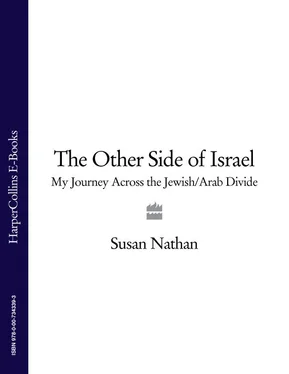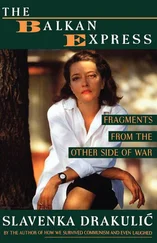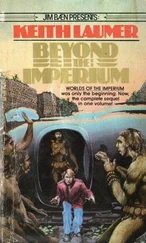SUSAN NATHAN
The Other Side of Israel
MY JOURNEY ACROSS
THE JEWISH-ARAB DIVIDE

In memory of my parents,Sam and Maisie Levy.
And for my children,Daniel and Tanya.
Cover
Title Page SUSAN NATHAN The Other Side of Israel MY JOURNEY ACROSS THE JEWISH-ARAB DIVIDE
Dedication In memory of my parents,Sam and Maisie Levy. And for my children,Daniel and Tanya.
1: The Road to Tamra
2: Death of a Love Affair
3: Second-Class Citizens
4: Echoes of Apartheid
5: The Missing Left
6: A Traumatized Society
7: Where Next?
Glossary
Sources
INDEX
ACKNOWLEDGEMENTS
About the Author
Praise
Copyright
About the Publisher
The road to the other side of Israel is not signposted. It is a place you rarely read about in your newspapers or hear about from your television sets. It is all but invisible to most Israelis.
In the Galilee, Israel’s most northerly region, the green signs dotted all over the highways point out the direction of Haifa, Acre and Karmiel, all large Jewish towns, and even much smaller Jewish communities like Shlomi and Misgav. But as my taxi driver Shaher and I look for Tamra we find no signs. Or none until we are heading downhill, racing the other traffic along a stretch of dual carriageway. By a turn-off next to a large metal shack selling fruit and vegetables is a white sign pointing rightwards to Tamra, forcing us to make a dangerous last-minute lane change to exit the main road. Before us stretching into the distance is a half-made road, and at the end of it a pale grey mass of concrete squats within a shallow hollow in the rugged Galilean hills. Shaher looks genuinely startled. ‘My God, it’s Tulkaram!’ he exclaims, referring to a Palestinian town and refugee camp notorious among Israelis as a hotbed of terrorism.
A few weeks earlier, in November 2002, I had rung the removals company in Tel Aviv to warn them well in advance of my move to Tamra, a town of substantial size by Israeli standards, close to the Mediterranean coast between the modern industrial port of Haifa and the ancient Crusader port of Acre. Unlike the communities I had seen well signposted in the Galilee, Tamra is not Jewish; it is an Arab town that is home to twenty-five thousand Muslims. A fact almost unknown outside Israel is that the Jewish state includes a large minority of one million Palestinians who have Israeli citizenship. Comprising a fifth of the population, they are popularly, and not a little disparagingly, known as ‘Israeli Arabs’. For a Jew to choose to live among them is unheard of. In fact it is more than that: it is inconceivable.
When I told my left-wing friends in Tel Aviv of my decision all of them without exception were appalled. First they angrily dismissed my choice, assuming either that it was a sign of my perverse misunderstanding of Middle Eastern realities or that it was a childish attempt to gain attention. But as it became clear that my mind was made up, they resorted to more intimidatory tactics. ‘You’ll be killed,’ more than one told me. ‘You know, the Arabs are friendly to start with, but they’ll turn on you,’ advised another. ‘You’ll be raped by the men,’ said one more. Finally, another friend took me aside and confided darkly: ‘I have a telephone number for a special unit in the army. They can come in and get you out if you need help. Just let me know.’
The woman at the removals company was less perturbed. ‘Will it be possible for you to move me from Tel Aviv to Tamra?’ I asked, concerned that as far as I could discern no one was living as a Jew inside an Israeli Arab community. I told her that if they had a problem with the move, they should tell me now. ‘Madam, we will deliver your belongings to anywhere in the state of Israel,’ she reassured me.
I arranged for Shaher, who I had used often in Tel Aviv, to collect me from my apartment on the day of the move. On the two-hour journey north we would lead the way in his taxi, with the removal truck following behind. Shaher phoned the day before to reassure me. ‘I have been looking carefully at the road map and I’ve devised a route to the Galilee which won’t involve passing too many Arab villages,’ he told me. ‘But we are heading for an Arab town,’ I reminded him. ‘Why on earth would I be worried about the route?’ Shaher did not seem to get my point.
We set off early the next day. Shaher was soon announcing, unbidden, his concern at my move to Tamra. What followed was a surreal exchange, the first of many such conversations I would have with taxi drivers and other Jews I met after I started living in Tamra. ‘So why are you moving there?’ he asked several times, apparently not persuaded by my reply each time, ‘Because I want to.’ Finally, he changed tack: ‘You know it’s an Arab area?’ Yes, I said, I think I know that. ‘So have you got an apartment there?’ Yes. ‘How did you get an apartment?’ I rented it, I said, just as I had done in Tel Aviv. Under his breath I could hear him muttering, ‘But it’s an Arab area.’ Then suddenly, as though it were a vital question he should have asked much earlier, he said: ‘Do you have a gun?’ Why would I need a gun, I asked. ‘Because they might kill you.’ I told him he was talking nonsense. Silence separated us until his face changed again. ‘Ah,’ he said, ‘you must be working for the government and I didn’t know it.’ No, I said, I work just for myself. ‘But it’s an Arab area,’ he said again.
It was a cold winter’s day, but by the time we reached the road into Tamra I could see Shaher starting to break out into a sweat. In a final offer of help, he said: ‘Susan, you have my telephone numbers. If you need to come back to Tel Aviv, just call me.’
We followed the only proper road in Tamra to the central mosque and then negotiated our way up a steeply sloping side-street till we reached my new home, hidden down a small alley. I was renting the top-floor apartment in a three-storey property belonging to a family I had already befriended, the Abu Hayjas. Several members of the family came out to greet me, including the matriarch of the house, Hajji, and one of her granddaughters, Omayma. I went into the ground-floor apartment and had been chatting for maybe twenty minutes when Omayma interrupted. ‘Susan, why don’t they get out and start moving your furniture?’ I went to the door and looked over to the removal truck for the first time since we entered Tamra. The two young men sitting inside the cab looked as if they were afflicted with total paralysis. I turned to Omayma and replied, only half-jokingly: ‘Because they think you are going to eat them.’
I went over to the truck and knocked on the closed window, telling them it was time to get to work. They didn’t look too convinced, and could only be coaxed out when Hajji proved the natives’ hospitality by bringing out a pot of coffee, two cups and some biscuits, and placing them on a table close to the truck. Once out in the street the removal men opened the back of the truck and did the job in no time, running up and down the stairs with the boxes. Finished, they hurried back into the truck and raced down the steep street back towards the mosque and onwards to freedom. I never saw them again. The reinforced cardboard packing boxes they were supposed to return for a week later remained in my spare room uncollected for weeks. Eventually I rang the company. ‘I’m sorry, but they won’t come back to an Arab area just for the boxes,’ said the woman Ispoke to.
Читать дальше













